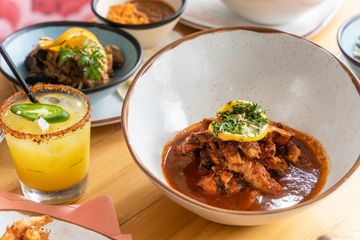Is Mexican Food Healthy? Unboxing the Nutritional Advantages of Typical Active Ingredients
The concern of whether Mexican food is healthy and balanced welcomes an exploration of its typical components. Beans and corn offer as foundational staples, rich in protein and fiber. Avocados supply helpful fats, while different herbs and flavors add flavor and health and wellness benefits - mexican food. Together, these elements develop a tapestry of nutrition. The healthiness of Mexican cuisine often depends on prep work approaches and portion dimensions. What duty do these elements play in determining its general dietary value?
The Power of Beans: Healthy Protein and Fiber-Rich Staples
Typically neglected, beans offer as a foundation of Mexican cuisine, offering a wealth of dietary advantages. Rich in protein, they are a superb plant-based choice for those seeking to fulfill their dietary healthy protein requires. This high healthy protein content sustains muscle fixing and growth, making beans invaluable for both vegetarians and meat-eaters alike. Furthermore, beans are an exceptional resource of dietary fiber, which assists in digestion and advertises a sensation of fullness, possibly aiding with weight management.
The selection of beans utilized in Mexican dishes, such as black beans, pinto beans, and kidney beans, adds to a varied taste account and can boost dishes nutritionally. Furthermore, beans are reduced in fat and consist of important minerals and vitamins, including iron, magnesium, and folate. With each other, these characteristics make beans an essential component, providing both nourishment and food in conventional Mexican price.

Corn: a Versatile Grain With Nutritional Benefits
Corn stands out as a versatile grain basic to Mexican cuisine, commemorated not only for its culinary applications however additionally for its remarkable dietary account. As a key active ingredient in recipes like tortillas, tamales, and pozole, corn provides important nutrients that add to a well balanced diet regimen. Rich in carbs, it serves as a significant power source, while likewise being low in fat, making it a favorable choice for various dietary demands.
Corn is a good resource of nutritional fiber, which assists in digestion and promotes satiety. It contains substantial amounts of vitamins such as B-complex vitamins, which are crucial for basal metabolism. The presence of anti-oxidants, specifically carotenoids, adds to overall health and wellness by minimizing oxidative tension. Additionally, corn is gluten-free, catering to those with gluten level of sensitivities. Generally, the dietary benefits of corn highlight its significance in traditional Mexican food and its function in a healthy and balanced diet plan.
Avocados: Healthy And Balanced Fats and Nutrients in Every Bite
Avocados play a considerable duty in Mexican cuisine, matching dishes with their creamy appearance and rich taste. Beyond their cooking allure, avocados are celebrated for their impressive dietary profile. They are an abundant resource of healthy and balanced monounsaturated fats, which can aid lower poor cholesterol levels and assistance heart health. In addition, avocados are packed with necessary nutrients, consisting of potassium, vitamin E, and B vitamins, contributing to general wellness.
The high fiber content in avocados help digestion and promotes satiation, making them a valuable enhancement to any kind of meal. Their distinct nutrient composition can likewise sustain skin health and wellness and offer anti-inflammatory benefits. Incorporating avocados right into typical Mexican dishes or enjoying them as a standalone snack can boost both flavor and nutrition, showing why they are a beloved staple in Mexican food. Overall, avocados supply a tasty means to take pleasure in healthy fats and important nutrients in every bite.

Natural Herbs and seasonings: Flavorful Wellness Boosters
While enjoying the rich tastes of Mexican food, one can not forget the crucial role that spices and herbs play in improving both taste and health and wellness. Ingredients such as oregano, cilantro, and chili peppers not just contribute to the vivid flavor account but likewise offer significant health benefits. Cilantro is recognized for its cleansing residential properties, helping to eliminate heavy metals from the body, while oregano is packed with antioxidants and possesses anti-inflammatory effects.
Chili peppers, a staple in several Mexican dishes, have capsaicin, which has actually been connected to improved metabolic process and discomfort relief. In addition, seasonings like cumin and coriander assistance food digestion and may help in blood glucose regulation. Including these delicious health and wellness boosters right into meals not only enhances the cooking experience but additionally promotes overall wellness, making Mexican food not just tasty, but also nutritionally useful.
Conventional Cooking Approaches: Enhancing Nutrition and Taste
Conventional cooking approaches in Mexican cuisine play a vital duty in improving both nourishment and taste, as they usually focus on fresh components and classic techniques. Techniques such as nixtamalization, where corn is soaked and cooked in an alkaline option, not just boost the nutrient account of tortillas yet also boost their digestibility - take out and delivery. Additionally, the usage of sluggish cooking methods, like stewing or braising, allows flavors to fuse beautifully while maintaining the click here for more info integrity of the components

Regularly Asked Inquiries
Are Mexican Food Portions Commonly Larger Than Other Foods?
Mexican food portions are often larger than those of numerous various other cuisines. This characteristic reflects standard dining methods, stressing common sharing and hearty meals, which can lead to a more significant serving dimension generally.
Exactly how Does the Preparation Approach Affect Healthfulness of Mexican Food?
Preparation approaches significantly influence the healthiness of Mexican food. Techniques such as barbecuing or steaming maintain nutrients, while frying can boost unhealthy fat material. Options of ingredients and cooking designs inevitably determine total dietary worth.
Can Mexican Food Be Tailored for Specific Dietary Constraints?
Mexican food can without a doubt be customized for certain nutritional limitations. Alternatives, such as utilizing corn tortillas for gluten-free diet plans or including more veggies, enable individuals to appreciate standard tastes while accommodating different dietary requirements.
What Prevail Misunderstandings Concerning Mexican Food and Health?
Usual misconceptions about Mexican food consist of the belief that it is naturally harmful, overly hot, and solely concentrated on fats. In fact, conventional recipes usually feature nutritious components and can be tailored to various nutritional demands.
Exist Much Healthier Alternatives at Mexican Dining Establishments?
Healthier alternatives at Mexican dining establishments frequently consist of smoked meats, beans, and fresh vegetables. Selecting dishes that highlight entire active ingredients and preventing hefty sauces can cause a more nutritious dining experience, advertising total wellness.
The range of beans used in Mexican recipes, such as black beans, pinto beans, and kidney beans, contributes to a varied taste profile and can This Site improve dishes nutritionally. Avocados play a substantial duty in Mexican cuisine, enhancing dishes with their velvety appearance and rich taste. Incorporating avocados into typical Mexican meals or appreciating them as a standalone snack can boost both taste and nourishment, showing why they are a beloved staple in Mexican cuisine. While taking pleasure in the abundant flavors of Mexican food, one can not forget the necessary function that spices and natural herbs play in enhancing both preference and health. Conventional cooking methods in Mexican cuisine play an essential function in enhancing both nutrition and flavor, as they frequently focus on time-honored strategies and fresh ingredients.